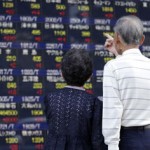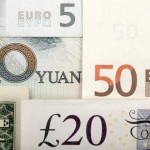Key financial events coming this week

The yen tumbled to the weakest since March after Bank of Japan Governor Haruhiko Kuroda said it’s crucial for inflation to exceed the 2 percent target. Asian stocks slipped after China’s central bank chief warned again about excessive leverage and President Donald Trump brought up trade grievances on a trip to the region.
Hong Kong’s Hang Seng Index pared losses after dropping the most in more than two weeks in the wake of People’s Bank of China Governor Zhou Xiaochuan’s latest salvo on the continuing accumulation of financial risks. Japanese equities joined a selloff after the yen’s decline offered support earlier. Kuroda underscored in a speech Monday that the BOJ is committed to overshooting its inflation goal, auguring no appetite for tapering stimulus. Oil extended an advance above $55 a barrel, with traders keeping an eye on the surprise power shakeup in Saudi Arabia over the weekend. Iron ore surged more than 5 percent.
“Governor Kuroda is repeating what he said after the BOJ’s meeting last week but the dollar-yen is getting more support as the market starts to anticipate dollar divergence becoming a key driver again of price action,” said Mansoor Mohi-uddin, head of currency strategy in Singapore at NatWest Markets, a unit of Royal Bank of Scotland Group Plc. “The BOJ, like other major central banks, is signaling it will not lift interest rates anytime for the foreseeable future. In contrast, the Fed continues to stress its tightening bias. That is laying the conditions for a broader-based rally for the greenback across the board.”
Trump in Tokyo on Monday complained of unfair trade with Japan, pressing the country to step up investment in the U.S. He goes on to South Korea and China this week, with further prospects for trade tensions to pop up. Read more on Trump’s trip to Asia here. Over the weekend, the president claimed credit for the rise in U.S. stocks, which on Friday capped the longest run of weekly advances since 2013.
The anti-corruption crackdown in Saudi Arabia has ensnared top officials and billionaires, including Prince Alwaleed bin Talal, known for his investments in companies such as Citigroup Inc. and Apple. Saudi Arabia’s Tadawul All Share Index fell as much as 2.2 percent on Sunday before erasing losses to end up 0.3 percent. Kingdom Holding Co., Alwaleed’s investment vehicle, tumbled 7.6 percent.
News on central bankers also will be closely watched. Federal Reserve Bank of New York President William Dudley is close to announcing his retirement, according to CNBC. His early departure would mean the top three positions at the Fed changing over within a relatively short period. Trump announced last week that Fed Governor Jerome Powell will be nominated to replace Janet Yellen when her term expires in February. Vice Chairman Stanley Fischer retired in mid-October.
Friday’s U.S. payrolls data provided a mixed picture of the strength of the labor market, though distortions from the hurricanes in August made it difficult to draw firm conclusions. Based on fed fund futures, the odds for a rate hike in December were little changed.
Here are key events to watch out for this week:
- The Reserve Bank of Australia is expected to keep interest rates on hold at a policy-setting meeting on Tuesday.
- Other central banks setting monetary policy this week include: Argentina, Mexico, New Zealand, Peru, Malaysia, Poland, Serbia and Thailand.
- China releases third-quarter current account; October foreign-exchange reserves and October CPI and PPI this week.
- Indonesia’s third-quarter GDP expanded at a slower-than-expected pace, rising 5.06 percent from a year earlier versus a median estimate of 5.2 percent.
- U.S. consumer sentiment probably cooled in early November from a more than 13-year high. The University of Michigan’s report on Friday wraps up a light week for U.S. economic data that also includes figures on job openings in September.
- New York Fed’s Dudley gives a speech on “Lessons from the Financial Crisis” at an Economic Club of New York luncheon on Monday.
- OPEC releases its World Oil Outlook.
- Earnings season continues with announcements from Toyota Motor Corp., BMW AG, Walt Disney Co., Adidas AG, and Siemens AG.
- Also this week, the European Central Bank publishes its economic bulletin and the European Commission updates its economic projections for the euro area.
Stocks
- The Topix index was down 0.1 percent percent at the close, and the Nikkei 225 Stock Average was little changed.
- Australia’s S&P/ASX 200 Index fell 0.1 percent, while South Korea’s Kospi index fell 0.4 percent.
- Hong Kong’s Hang Seng Index fell 0.2 percent.
- Futures on the S&P 500 were down 0.2 percent. The main gauge rose 0.3 percent on Friday.
- The CBOE Volatility Index, known as the VIX, dropped 8 percent to a record-low 9.14 on Friday.
- The MSCI Asia Pacific Index declined 0.2 percent.
Currencies
- The yen dropped 0.2 percent to 114.30 per dollar, paring an earlier decline of more than 0.5 percent.
- The Aussie dollar traded at 76.53 U.S. cents.
- The South Korean won lost 0.2 percent to 1,115.38 per dollar.
- The euro was steady at $1.1612.
- The Bloomberg Dollar Spot Index was little changed.
Bonds
- The yield on 10-year Treasuries was little changed at 2.34 percent. It fell more than seven basis points last week.
- Australian 10-year yields were steady at 2.57 percent.
Commodities
- West Texas Intermediate crude rose 0.2 percent to $55.78 a barrel. It jumped 2 percent on Friday.
- Gold was flat at $1,270.04 an ounce.
- Iron ore rose 5.2 percent to 464 yuan per ton on the Dalian Commodity Exchange.
Source: Bloomberg – Asia Stocks Drop, Yen Slides to Lowest Since March: Markets Wrap





























